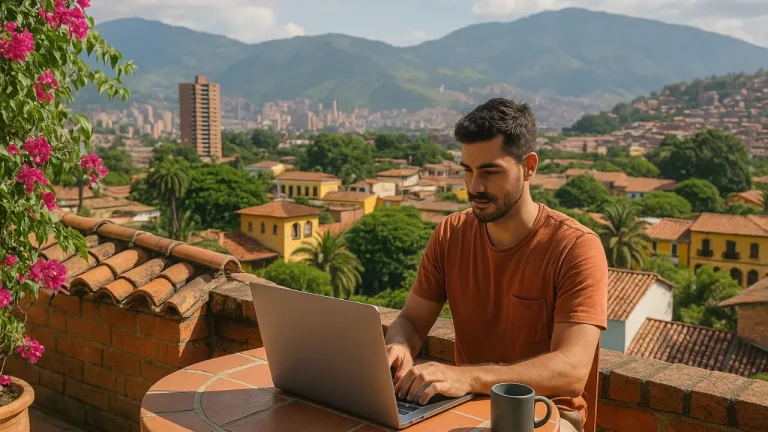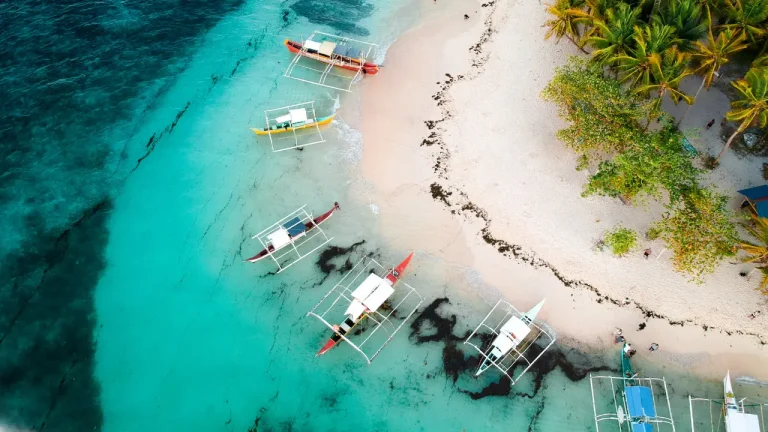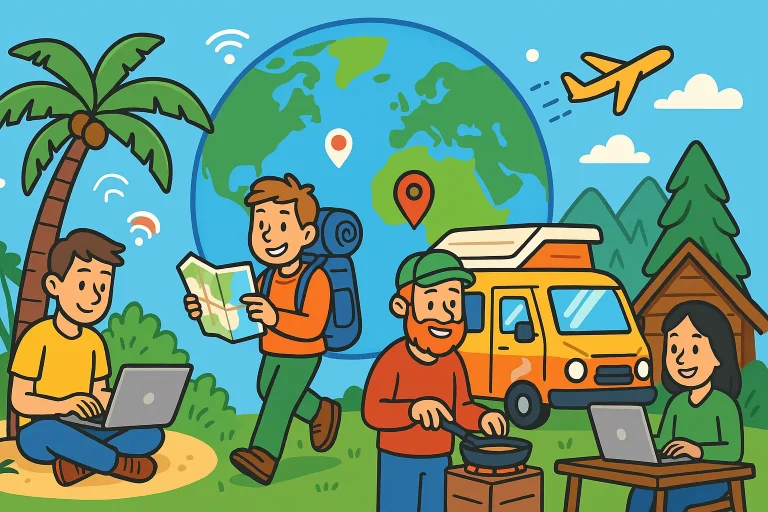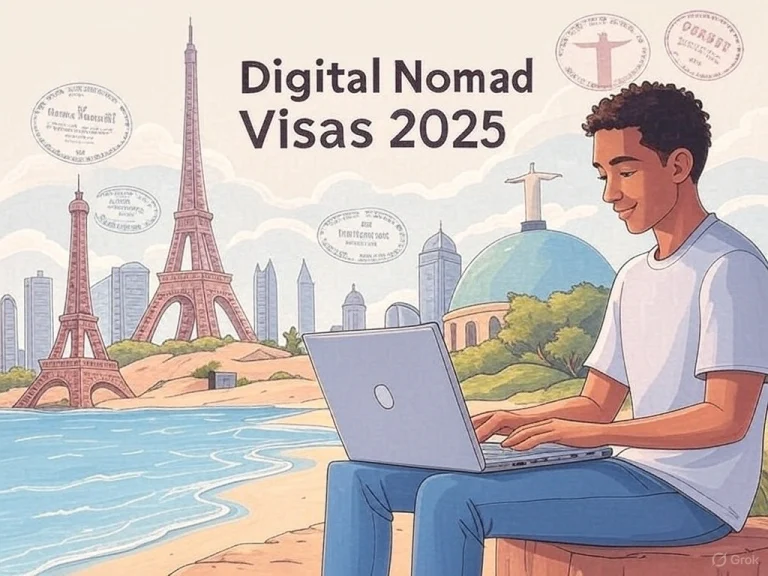Malaysia Digital Nomad Visa: What I Learned Before Even Applying
I spent weeks researching Malaysia’s digital nomad visa and found out it’s way more complicated than it looks online.

I’ve always dreamed of working while traveling, so I started looking into the Malaysia digital nomad visa. What I found during my research into the DE Rantau Visa surprised me, it’s not as simple as it first sounds. Here’s what I learned.
Quick Takeaways
- Malaysia’s DE Rantau Visa lets remote workers stay up to 24 months, but the process can be slow and unpredictable.
- Many applicants face 4–6 month delays, unclear rejections, and frequent requests for extra documents, prepare to follow up often.
- Health insurance is a common rejection point. Make sure your plan clearly covers Malaysia and includes your stay duration.
- The lifestyle is affordable and welcoming, but some nomads still choose tourist visas because they’re easier and faster.
What Is the DE Rantau Visa?
Malaysia’s digital nomad visa, called the DE Rantau Visa, is a program that lets remote workers live in Malaysia for up to 12 months. It can be renewed once, which means you could stay for up to two years without needing a traditional work or student visa.
Its official name is the Professional Visit Pass, or Pas Lawatan Ikhtisas, and it’s managed by MDEC, Malaysia’s Digital Economy Corporation.
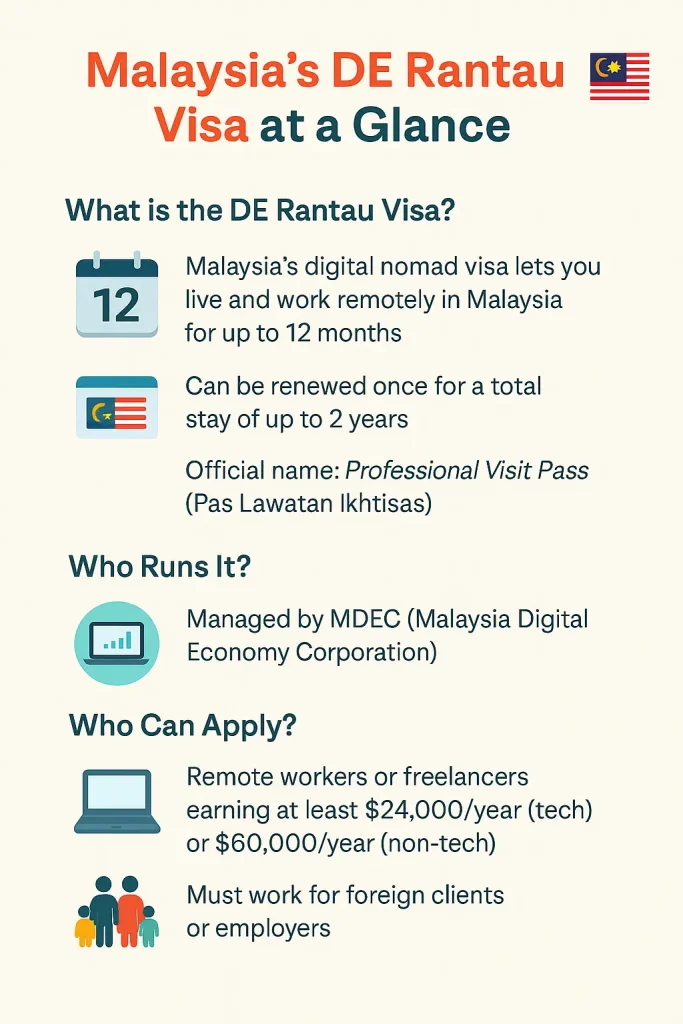
Who can apply?
- Remote workers or freelancers earning at least 24,000 USD per year in tech jobs or 60,000 USD in non-tech roles
- People who work for foreign companies or clients
- Applicants who want to bring their spouse and children along
The fee is 1,000 MYR for the main applicant and 500 MYR per dependent. You apply online and need to upload several documents including contracts, proof of income, bank statements, and medical insurance.
MDEC says it takes 4 to 8 weeks to process. But here’s what I learned after digging deeper.
The Process on Paper vs Reality
Many digital nomads who applied for the DE Rantau Visa shared that the actual process took much longer than advertised. Some people said it took four to six months just to get a response. Others were rejected after more than 70 days, and they never got a clear reason.
One applicant was told their role “lacked a digital element” despite working in blockchain. Another was initially rejected but later approved after submitting a new salary statement.
Document resubmissions were also common. Some applicants had to upload job performance reports, updated passport pages, and project portfolios. The list of requirements seems to grow after you submit your application.
Communication was another big issue. Emails often went unanswered. Several people had to send follow-ups every week just to hear anything back.
Some nomads said they eventually gave up and used tourist visas instead. With 90 days on arrival and the option to reset by briefly leaving and re-entering the country, it felt simpler to them than dealing with the paperwork.
Who Actually Qualifies?
This was one of the most confusing parts for me.
The rules clearly state that both tech and non-tech professionals can apply. But people with digital roles like marketing, content creation, and consulting often had mixed results.
One freelancer with a YouTube marketing background was rejected. Another person with less digital proof got accepted because they showed higher income.
It made me think I’d need to be extra careful with how I frame my remote work before applying.
The Insurance Confusion
Even if you provide medical insurance, it can still be denied. Several applicants were told their coverage was “insufficient,” but there’s no public list that explains what counts as enough.
Popular options include World Nomads, Safety Wing, and Remote Health. But none are officially approved. You have to make sure your policy:
- Covers at least 3 months
- Works in Malaysia
- Covers your spouse and children if they’re coming with you
Some people thought they were covered and still got rejected. That’s why I’d check directly with the insurer and MDEC before applying.
What About Taxes?
Malaysia generally does not tax foreign income. But if you transfer that money into a Malaysian bank account, or if you stay more than 182 days, you might be considered a tax resident.
Tax residents pay between 1 and 30 percent based on their income. Non-residents pay a flat 30 percent on Malaysian-sourced income.
If you do freelance work for Malaysian clients, you’ll probably need to pay tax locally.
The rules aren’t always clear, and many people online had different interpretations. I’d definitely talk to a local tax consultant before making any big moves.
Malaysia Compared to Other Nomad Visas
Here’s how Malaysia stacks up against some other popular nomad visa options:
| Country | Visa Duration | Minimum Income | Processing Time | Community Size |
|---|---|---|---|---|
| Malaysia | 12–24 months | 24,000–60,000 USD | 1–6 months | Growing |
| Thailand (LTR) | 10 years | 80,000 USD | Lengthy | Large |
| Bali (Indonesia) | 6 months | 1,200 USD/month | Easy | Very Popular |
| Portugal (D7) | Up to 5 years | Around 10,000 USD/year | Moderate | Strong |
Malaysia has lower living costs, a modest income requirement, and decent infrastructure for remote work. But the application process seems more inconsistent than other countries.
Life on the Ground in Malaysia
Malaysia offers a great lifestyle for remote workers.
- Rent ranges from 800 to 2,000 MYR per month, which is about 180 to 450 USD
- Meals cost between 10 and 30 MYR
- Grab rides are cheap, usually 5 to 15 MYR
- Internet speeds reach up to 100 Mbps in urban areas
- Coworking spaces like WORQ and Common Ground are common
Safety is good, English is widely spoken in cities, and there’s a strong sense of community. Facebook groups like “Digital Nomads in Malaysia” and “DE Rantau” are active and helpful.
Renewal and Long-Term Plans
You can renew the visa for another 12 months, but it’s not automatic. You’ll likely have to go through the same process all over again.
Some nomads leave and re-enter on tourist visas to extend their stay, but that’s not always a safe long-term plan. If you want to stay more than two years, Malaysia’s MM2H program is another option, but it has different rules and higher requirements.
Final Thoughts
Even though I’m not ready to apply just yet, this research gave me a clear picture of what to expect.
Malaysia’s DE Rantau Visa offers a lot. The cost of living is low, the lifestyle looks amazing, and the community is growing. But the process is not simple. Delays, rejections, and extra document requests are real issues.
If I ever do apply, I’ll take my time to prepare properly. I’ll make sure my insurance is valid, my documents are airtight, and I’ll probably join a few Facebook groups to stay updated.
I still believe it’s worth exploring. But I’ll go into it with open eyes.
Let’s Talk
Are you thinking about applying for Malaysia’s digital nomad visa? Have you gone through the process already? I’d love to hear what you learned.
I’m figuring all this out step by step, and I’m glad you’re here with me.
FAQs: Malaysia DE Rantau Digital Nomad Visa
How long does it take to get approved for the DE Rantau Visa?
Officially, approval takes 4 to 8 weeks, but many applicants report delays of 4 to 6 months, often due to document reviews or slow responses.
What are the income requirements for Malaysia’s digital nomad visa?
You must earn at least USD 24,000 annually for tech roles or USD 60,000 for non-tech professions, working for foreign companies or clients.
Is foreign income taxed under the DE Rantau Visa?
Generally, foreign income is not taxed unless you send it to a Malaysian bank. Staying over 182 days may trigger tax residency rules.
Why do applicants get rejected from the DE Rantau Visa?
Common reasons include unclear job descriptions, lack of a “digital element,” missing or invalid documents, and inadequate health insurance coverage.
How This Article Was Researched
This article is based on verified 2025 guidelines from the Malaysia Digital Economy Corporation (MDEC), supported by community insights from real applicants in Facebook groups like DE Rantau Digital Nomads, as well as forums on Reddit, NomadList, and blogs such as Medium and Citizen Remote.
It also includes factual comparisons with other nomad visa programs based on reports from Crowe Malaysia, Bright!Tax, and Digital Nomad Asia. All income thresholds, visa requirements, and processing timelines have been fact-checked for accuracy as of June 22, 2025.
This guide is written to help aspiring digital nomads make informed decisions before applying for Malaysia’s evolving remote work visa.


